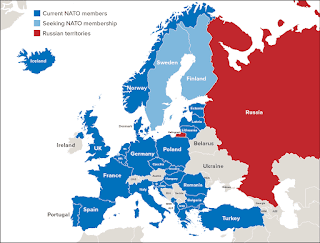 The Russo-Ukrainian War is now in a stalemate:
The Russo-Ukrainian War is now in a stalemate:- Started in February of 2014.
- Russia annexed Crimea in March 2014.
- In February of 2022, Russian launched a full-scale invasion of Ukraine.
- Some history.
- Crimea was part of the Crimean Khanate from 1441 until it was annexed by the Russian Empire in 1783.
- In the Russian Revolution of 1917, Ukraine was absorbed by the Russian Empire as a constituent republic
- Ukraine is the second-largest (1.7 times bigger than Germany) European country after Russia.
- In 1922 the Soviet Union was formed with various union republics, and until its dissolution in 1991, varied from 4 to 16 countries, always including Ukraine.
- After the death of Stalin in 1953, Crimea was transferred from the Russia to Ukraine.
- In subsequent years Ukrainians held many top positions in the Soviet Union, notably, Leonid Brezhnev became General Secretary from 1964 to 1982.
- The Chernobyl Nuclear disaster occurred in 1986.
- At the end of the Cold war Ukraine gained independence at the end of 1991.
- Then the Russo-Ukraine war began in February of 2014 and Russia invaded Ukraine on 24 February 2022.
- Ukraine gained candidate status to the European Union on 23 June 2022.
- What has happened and what about the future?
- The expected overwhelming defeat of Ukraine did not occur.
- NATO has been strengthened, with Scandinavian countries joining or in the process of securing membership.
- Poland has emerged as a major European player.
- Hungary has linked closer to Russia.
- Romania is cautious.
- Bulgaria is politically divided.
- There remains the aura of Russia going nuclear.
- This the greatest danger to humanity today, certainly more so than global warming, if escalation leads to the dreaded nuclear winter.
- There are around 15,000 nuclear weapons on Planet Earth with the energy equivalent of 15 times the Krakatoa volcanic eruption, the most powerful ever.
- Watch this video.
On a less monumental level, the USA is in the process of changing the name of nine military bases named after Confederate generals. This will all occur by next year
- The Department of Defense will spend $62.5 million to change street names...etc.
- Fort Benning, Georgia, is now Fort Moore, after Lt. Gen. Hal and Julia Moore, the first carrying the name of a couple. Hal served in Vietnam and Julia successfully lobbied Congress to have military families notified of casualties in person of by telegram.
- Fort Hood, Texas, is now Fort Cavazos, honoring Richard Cavazos, the first Hispanic American to became a four-star General.
- To come:
- Fort Gordon to Eisenhower.
- Fort Bragg to Liberty (not a person).
- Fort Hill to Dr. Mary Walker.
- Fort Lee to Gregg-Adams.
- Fort Picket to Barfoot (after Technical Sergeant Van Barfoot).
- Fort Polk to Johnson (after Sgt. William Henry Johnson).
- Fort Rucker to Novosel (after Chief Warrant Officer 4 Michael Novosel).
- I guess only Army bases are being renamed. There must be no Confederate-named navy bases, and certainly there were no airplanes around the time of the Civil War.
- Current Turkish President Recep Tayyip Erdogan and opposition leader Kemal Kilicdaroglu are heading for a runoff on May 28. Turnout was 89%. Needed more than half the votes to win, and Erdogan got 49.5 votes. This means he almost surely will continue as president. He has been in control for two decades.
- Thailand's reformist opposition, the Move Forward Party, led by Pita Limjaroenrat (right), won the most seats in the general elections, rejecting the military-backed parties that have ruled the country for nearly ten years.
- Add the populist Pheu Thai Party, and the two were projected to win about 286 seats of their 500-member House of Representatives. This was a kind of upset, because the PTP, linked to the billionaire Shinawatra family, was expected to prevail.
- The MFP is youthful and also called for curbs on the powers of King Maha Vajiralongkorn, a not particularly respected king, by Thai standards.
- The United Thai Nation Party of Prime Minister Prayuth Chan-ocha, who seized power as army chief in the 2014 coup, was in fifth place.
- There seems to be a sense that the MFP and PTP will work together.
- But the Thai political system of leadership also includes the input of the Senate, which is controlled by the military and king.
- Any coalition will need to get 376 total votes of the combined House and Senate to name the prime minister.
- In 2019, Prayuth of the UTNP, got all the Senate votes, and cobbled together a coalition of 19 different parties to keep him in office.
- At this point, it will take weeks to work out the kinks.
- Then the military could just stage another coup, supported by the king.
- Thai politics have been like this for a very long time.
- I've been caught in the country during a variety of coups and protests, and was involved once by serving as a conduit to get information to the U.S. government. Read my posting of 2014 on this subject.
Heading this all is General Prayuth Chan-ocha. He kind of looks like FM el-Sissi and appears to have the same hat. I was in Bangkok around a quarter century ago when there was another military coup, and, as the Thai and American governments could not officially communicate, I helped serve as a courier of information between the U.S. Embassy and the Thai equivalent of the Department of Energy. Made a lot of good friends and we later worked out a research and education exchange program.
- Also in that article was reference to then Prime Minister Yingluck Shinawatra (right), and a protest that resulted in 30 deaths and my early departure from Bangkok. Here is how tourism was being affected by curfews and such.
I'll close with that current political crisis, the national debt. Supposedly, the U.S. goes into default by the end of this month unless President Joe Biden and House Speaker Kevin McCarthy agree on something. They meet tomorrow.
- The Republican position is that the U.S. debt is appalling, and we need to cut the budget by reducing spending. Most Americans agree. This is why McCarthy is making such a big fuss of this crisis. Politics and looking good going into the next election next year.
- Except for 1835-1836, the U.S. has continuously had a fluctuating public debt since the Constitution went into effect in 1789.
- There was no debt ceiling in force in all of our history until 1917 when a limit was placed.
- More recently, the national debt has increased under every president since Herbert Hoover.
- In 1979 when I worked for the U.S. Senate, the Gephardt Rule automatically raised the debt when a budget was passed.
- However, this was repealed in 1995.
- Since 2000 the debt ceiling has been raised 90 times.
- In 2011, Republicans used the debt ceiling as leverage for deficit reduction, resulting in the Dow Jones falling 2000 points in July and August.
- 2013 led to another crisis, when Republicans refused to raise the debt ceiling unless President Obama defunded Obamacare. Republican ratings declined. The debt ceiling was increased.
- 2021 had another crisis triggered by Republicans, resulting in a ceiling of $31.4 trillion.
- 2023, they're at it again. This Republican debt-ceiling madness occurs whenever there is a Democrat as president.
- The U.S. actually reached this $31.4 trillion point in January, but took extraordinary fiscal measures to avoid defaulting on obligations.
- However, this can go on only until the end of May...said Treasury Secretary Yellen...but actually, we should be good until some time this summer.
- At that point, there will be market dislocations (stock market crash, for example) and the spurring of another recession.
- Republicans almost welcome these prospects to improve their position on 5 November 2024 for the general election. Plus, their Freedom Caucus has a lot of influence over who will continue to be Speaker of the House.
- Republicans will hold fast, probably forcing Biden to just raise the ceiling by invoking the 14th Amendment or pushing for a discharge petition to actually vote on this matter in the House.
- Brinksmanship will be the commanding strategy, on both sides.
- Read this article for possible outcomes, but the bottom line is that a compromise will be reached. This is as predictable as the sun will rise tomorrow.
- Ironically, in recent administrations, Republican presidents have been the cause of our national debt.
- Oh well, there remains the matter of owing so much money and how much our taxes increase because of this. However, keep in mind that taking care of your personal finances should not be equated to the running of a government. Read my Huffington Post essay on this subject.
- There is, though, this U.S. Debt Clock, which equates this debt to you, personally. Every taxpayer owes $247,767, which is kind of scary, until you read my HuffPo.
-












_(cropped).png)










Comments
Post a Comment